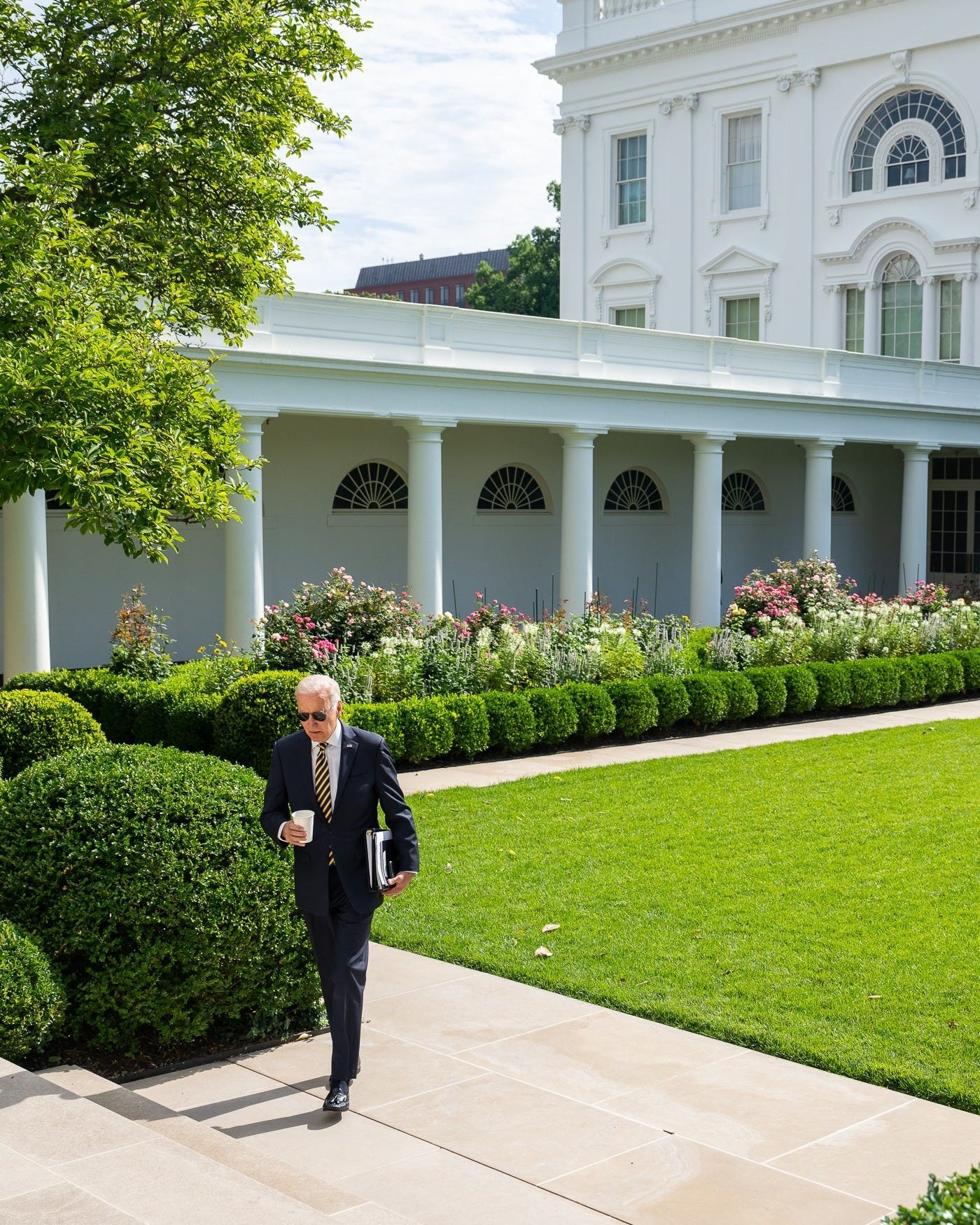Will President Joe Biden run in 2024? Here's his presidency summed up so far
The Presidents current resume and can he make it to the 2024 presidential race?

As he ended his first year in office, President Joe Biden was asked by a reporter about a laundry list of problems facing the nation: high inflation, his stalled domestic agenda, COVID-19, and division throughout the nation.
A year later, some of those issues persist. Grocery prices are high, gas prices have been volatile, and the White House is warning of another COVID-19 winter surge. Biden saw other setbacks, including increasing migrant arrests at the southwest border and failed efforts to unravel former President Donald Trump's controversial border policies.
But he has also made progress on his domestic agenda.
His second year in office was marked by historic legislative achievements despite the Democrats' razor-thin majority in Congress. The measures included bills to improve the nation's infrastructure, reduce prescription drug costs and climate change, boost semiconductor manufacturing, and promote gun safety. He nominated, and the Senate confirmed, the first Black woman to the Supreme Court.
And he rallied world leaders in defense of Ukraine against Russian aggression.
Biden's approval ratings, though still underwater, have ticked up slightly since the midterm elections, which exceeded expectations for Democrats when predictions of a so-called "red wave" of Republican victories fizzled.
Here are some of the highs and lows from Biden's second year:
Success: Ukraine
President Joe Biden talks with Ukrainian President Volodymyr Zelenskyy outside the White House. Kent Nishimura / Los Angeles Times via Getty Images
Russian President Vladimir Putin expected a swift and decisive victory when he ordered an invasion of Ukraine in February 2022. Instead, Russian forces are struggling and Ukrainian President Volodymyr Zelenskyy said his country "is alive and kicking."
"Against all odds and doom-and-gloom scenarios, Ukraine didn't fall," Zelenskyy told members of Congress during a historic visit to Washington, DC, in December.
Biden has led a multinational coalition to support Ukraine and impose sanctions on Russia while the US has provided billions in humanitarian and military assistance, including a Patriot missile battery in December to boost Ukraine's air defense.
Biden faced criticism for calling Putin's actions in Ukraine "genocide" and saying he "cannot remain in power." Republicans blamed the war on Biden, calling him weak.
Biden could have "tried harder to prevent the war," wrote Michael E. O'Hanlon of the Brookings Institute in October. But Biden helped lead an economic response that has "cut off most high-tech cooperation between the West and Russia" and "rightly decided that the United States should not directly enter the conflict and risk World War III," O'Hanlon wrote.
Conservative New York Times columnist Bret Stephens in September called the "staggering gains" by Ukrainian forces "a victory for Joe Biden, too." Beyond military equipment assistance, he wrote, the US is providing "battlefield intelligence that enables them to maneuver, target, strike and evade in ways they otherwise couldn't."
Success: First Black woman to SCOTUS

Biden's judicial nominations have promoted diversity on the federal bench, most notably with the historic confirmation of Ketanji Brown Jackson, the first Black woman to serve as a Supreme Court justice.
Jackson won bipartisan support with three Republicans — Sens. Susan Collins of Maine, Lisa Murkowski of Alaska, and Mitt Romney of Utah — joining 50 Democrats to vote in favor of her confirmation.
Her swearing-in represented "a profound step forward for our nation, for all the young, Black girls who now see themselves reflected on our highest court, and for all of us as Americans," Biden said in June.
Judicial nominations have been a priority for Biden, with more than 90 Article III federal judges confirmed, according to the Federal Judicial Center.
The White House in November said 67% of his nominees were women and 66% were people of color.
Success: Pushing through some bipartisan legislation
As a presidential candidate, Biden was greeted with skepticism by progressives when he touted the virtue of bipartisan dealmaking. But his second year in office ends with trillions of dollars pledged to infrastructure and semiconductor manufacturing.
Even Republicans, such as former House Speaker Newt Gingrich, have conceded that many in the GOP underestimated the president, whom right-wing critics taunt as being too old. Instead, the leader some Democrats refer to as "Dark Brandon" continued to sign more deals into law, including the largest gun safety legislation in nearly 30 years and expanded benefits for veterans exposed to toxic environments such as burn pits.
In ceding the spotlight to Congress, Biden has found a way to fulfill a slew of campaign promises.
But it hasn't been all kumbaya across Washington. Just as with COVID-19 relief, Democrats turned to a budget maneuver that allowed them to pass major priorities — including the largest investment in climate-related programs in US history and a major expansion of Medicare's power to lower drug costs — without a single Republican vote.
Failure: Inflation
President Joe Biden arrives for an event focused on inflation and the supply chain at the Port of Los Angeles in June. Evan Vucci/AP
It was supposed to be "transitory." It wasn't.
The good news is that Americans are starting to feel relief as inflation has cooled for five months straight.
The bad news is that inflation still hit peaks not seen in 40 years and there's still no guarantee disaster isn't looming for the broader economy.
Biden and his team like to point out that the US is far from the only nation that faced record inflation as COVID-19 mostly receded and riddled the world with supply chain disasters.
Some economists, including Clinton Treasury Secretary Larry Summers, argue that Biden made it worse last year by pushing for a $1.9 trillion pandemic relief plan that overheated the economy.
Over time, the administration ramped up pressure on large corporations that it blamed for exacerbating price hikes.
At the pump, gas prices soared as supply-chain issues and Putin's invasion of Ukraine disrupted the global market. Biden signed off on record releases from the nation's strategic oil reserves — even though economists said such action wouldn't provide much relief. Gas prices have since fallen back below their record highs.
The reality is that both issues are difficult for the White House or even Congress to tackle. That's why now and next year the focus will be on the Federal Reserve, which has aggressively raised interest rates to keep inflation in check — a move the central bank is likely to continue in 2023.
Failure (still lingering): Afghanistan

Biden's record in the war-ravaged country was mixed in 2022 after his chaotic troop withdrawal in 2021.
In August, he announced that "justice has been delivered" after a drone strike killed Ayman al-Zawahiri, the al-Qaeda leader who oversaw the September 11, 2001 attacks with group founder Osama bin Laden.
The CIA operation in Kabul gave Biden an accomplishment to tout in Afghanistan. But the fallout from his handling of the withdrawal still lingers today.
Thousands of Afghans who worked with the US during the 20-year war remain in the country, fearing retaliation from the Taliban, the militant Islamist group that seized control after the US withdrawal.
A $1.7 trillion federal spending bill that passed Congress in December includes a measure to provide more visas for Afghans who worked with the US, but it omits legislation to provide a pathway to permanent residency for them.
The Taliban has taken severe action against women, including banning female education, most jobs for women, and most freedoms.
Investigating the botched withdrawal is likely to be a priority for Republicans when they take control of the House.
Anthony Cordesman, emeritus chair in strategy at the Center for Strategic and International Studies, said Biden could have done better in handling the collapse of the Afghan government and forces.
"But he inherited a lost cause, a failed and corrupt Afghan government, Afghan forces that could not fight on their own, and a peace process where the previous President had already announced the U.S. would leave on a fixed date," he wrote in an email. "The war was effectively lost before he took office."
This article was written by Jesus M. Arias
You can read the original article on Business Insider





